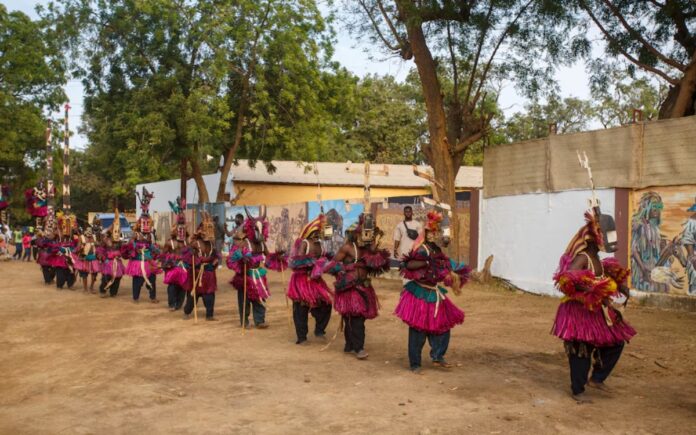Segou: The renowned Malian duo Amadou and Mariam captivated audiences along the banks of the Niger River, their melodies resonating through the air as the annual Festival sur le Niger unfolded. However, this year’s edition was imbued with a distinct political atmosphere, reflecting the shifting dynamics in West Africa.
Each February, tens of thousands of visitors from Mali and across the region gather in Segou, approximately 230 km (143 miles) northeast of the capital Bamako, for a vibrant week-long celebration of Malian music, visual arts, theatre, and dance. But this year, the festival took place against the backdrop of Mali’s departure from the Economic Community of West African States (ECOWAS) alongside Burkina Faso and Niger, as uncertainty looms over the military junta’s commitment to organizing elections.
For over a decade, Mali and its neighbors have been engaged in a protracted struggle against jihadist groups linked to Islamic State and al-Qaeda, while also contending with a long-standing Tuareg-led rebellion in the north. Despite its proximity—less than 100 km (62 miles) from areas where jihadist groups remain active—the festival remains a platform for discourse on pressing regional issues.
“It’s a forum…for forward-looking thinking on current concerns, including the very crisis that the Sahel is going through,” said Vincent Koala, a cultural consultant from Burkina Faso. “It’s all about reuniting the population after many crises.”
Listeners swayed as the celebrated Malian duo Amadou and Mariam sang from a stage on the banks of the Niger River at an annual festival in Mali. A renowned hub of culture in the region, the country’s art scene is under threat from jihadist activity https://t.co/aKWXlcmHCj pic.twitter.com/HSZ3pvN3ML
— Reuters (@Reuters) February 14, 2025
A Festival Under the Shadow of Political Shifts
Just days before the festival commenced in early February, Mali, Niger, and Burkina Faso formally exited ECOWAS, an organization that had been pressing for their return to democratic governance. The three nations have since formed the Alliance of Sahel States (AES), and authorities branded this year’s festival as the “Week of AES Fraternity.”
Throughout the festival grounds, portraits of the three junta leaders were prominently displayed, adding a distinct military undertone amid the colorful arts and crafts exhibits.
Cultural Richness Under Threat
Mali has long been a regional cultural powerhouse, hosting internationally acclaimed festivals that have showcased its rich heritage.
“Mali is a global cultural powerhouse,” said Culture Minister Mamou Daffe, who founded the Segou festival in 2005. “We have the most beautiful stories, we have beautiful sites… It is a reservoir. It is more important than gold and oil.”
However, the country’s vibrant arts scene faces mounting challenges. The Festival in the Desert, once a major event near Timbuktu that attracted global visitors, has not been held since 2012 following jihadist incursions into the historic city. Meanwhile, the Rencontres de Bamako photography biennale, which ran from mid-November to mid-January, struggled with diminished funding after losing French sponsorship. Anti-French sentiment has surged under Mali’s junta, which, like its counterparts in Burkina Faso and Niger, has expelled French forces.
Also Read | Ukraine Seeks ‘Real and Guaranteed’ Peace, Zelenskyy Tells U.S. VP Vance
In an effort to bolster security, the junta has aligned itself with Russian mercenary forces. A boat sailing on the Niger River during the festival flew both Malian and Russian flags, underscoring this evolving partnership. According to two consultants, a Russian mercenary base is situated roughly 20 km (12 miles) from Segou.
A Cultural Renaissance Amid Uncertainty
Despite the nation’s security and economic turmoil, junta leader Assimi Goita has declared 2025 the “Year of Malian Culture.” While this focus may appear unconventional given the country’s pressing challenges, authorities view culture as a bridge for diplomatic engagement.
Also Read | BSF Data: 75% of Drones Shot Down in Amritsar Were Launched from Lahore
“The festival is a great example of Mali’s opening up to the outside world,” Daffe said. “Arts and culture can promote exchanges within and beyond the country.”
As Mali navigates a complex political landscape, the Festival sur le Niger remains a testament to the enduring power of culture to unite communities and spark dialogue in uncertain times.



